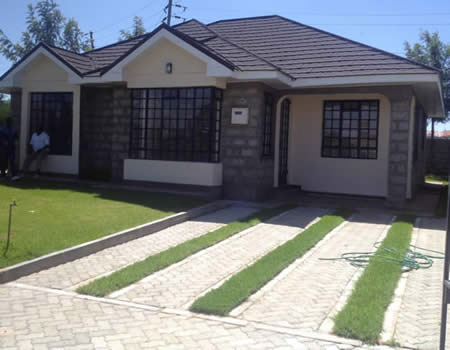BY IMMACULATE WAIRIMU / DAILY NATION
Living in a three-bedroom brick house with a compound where she practises small-scale farming is a dream MaryLouisa Wairimu had never thought possible. The story of the 71-year-old woman, who sells headscarves, khangas and water in the Kinyago Slum in Nairobi is one of victory over desperation and despair.
Between 1968 and 1985, she lived with her family in the Kinyago and City Cotton slums. They would put up temporary shelter using plastic bags and cartons for the night, and pull them down in the morning to avoid harassment by City Council askaris.
“We did not have the money to buy land or rent even the simplest houses, so we were exposed to the vagaries of weather,” says Ms Wairimu.
In 1985, the family moved to a mud house in Eastleigh Section Three, Nairobi. Later that year, when a foreigner who had been occupying seven acres of land in Biafra in the neighbourhood left the country, Ms Wairimu and her neighbours visited the Land office to find out about its ownership. They discovered that it was not registered in anyone’s name and, with the help of their MP, had it registered in their names two months later. The MP oversaw its subdivision among the families.
But they still had no money to build decent houses. Luckily, a Catholic priest offered them some iron sheets, wood and nails, but they had to buy the doors, windows and pay the builders.
“It was a blessing to us as all inconveniences of being homeless would end. Every family built two rooms, one to occupy and the other to rent,” says Ms Wairimu.
In the meantime, she and her neighbours had formed an association known as Undugu Society. It was through this association that they met a representative of the National Co-operative Housing Union (Nachu), who told them that even with their little money, they could own decent houses.
Seventeen members of Undugu Society then formed Rehema Housing Society and affiliated themselves to Nachu, the housing co-operatives’ umbrella body that mobilises finances to help low-income earners own homes.
In 2000, the group bought 2.5 acres of land on Kangundo road using a loan from Nachu. Nachu also helped them build two-room corrugated iron sheet houses as they waited to build their permanent houses. The land was subdivided into 40x90ft plots, each costing Sh64,000. The loan was to be repaid in instalments of Sh1,900 or Sh2,000, but those who could afford it paid more.
“Every member was allowed a comfortable period to repay the amount,” Ms Wairiumu says, adding that some completed the repayment in six months while others took longer.
To build a permanent, three-bedroom master en suite house, she took a Sh1.5 million loan, which was five times her savings.
The house, which was built in 2013, has a sizable kitchen, a big living room, a toilet and a bathroom, with another one outside.”
Ms Wairimu finished repaying the loan in May this year and is now the proud owner of a debt-free house.
“This is a dream I never thought possible,” says the mother of four and grandmother of eight.
Hers is not just a story of determination and resilience, but also that of the power of housing cooperatives in helping the poor own homes.
Developers have concentrated on the high-end market segment where returns are high, ignoring low-income earners. But housing cooperatives offer this group a ray of hope.
Indeed, the United Nations acknowledges housing cooperatives as a flexible and adoptable means of providing shelter.
With housing cooperatives in more than 60 countries, their contribution to the housing sector is enormous. For instance, 27 million Europeans live in houses built by co-ops. And housing co-operatives in Sweden and Germany, contribute 22 per cent and eight per cent of the housing stock respectively.
There were 9.2 million households in Kenya in 2014, 40 per cent of which were l in urban areas. The annual rural-urban migration currently stands at 4.4 per cent, or about 500,000 people, every year.
It is projected that by 2030, half of the country’s population will be urban-based, up from 32 per cent in 2009.
A recent World Bank report shows that private real estate developers in the country built 15,000 units in 2015, only two per cent of which were for low-income earners.
“With the average mortgage loan at Sh8 million, most Kenyan households cannot afford housing through this means. Co-operatives are one of the most viable ways of owning a house,” Nachu national Chairman Francis Kamande noted during the union’s AGM last month, adding that co-operatives deliver 90 per cent of housing in Kenya.
In 2015, more than 100,000 Kenyans took housing loans from co-operatives, which they will repay over periods of between three and seven years.
Formed in 1979, Nachu began operations in 1987, and has provided decent housing to the low- and modest-income households in many parts of the country.
In the last three years, the union has built more than 1,600 houses targeting low-income earners. They cost between Sh950,000 and Sh1.8 million. It plans to deliver more than 2,500 affordable houses annually in the next two years.
Nachu uses the incremental building method to build 100 and 200 units that take advantage of economies of scale, helping reduce associated costs such as infrastructure.
And the benefits cannot be gainsaid. “Were it not for a housing cooperative, I would still be living in deplorable conditions in the slums,” says Ms Wairimu.








